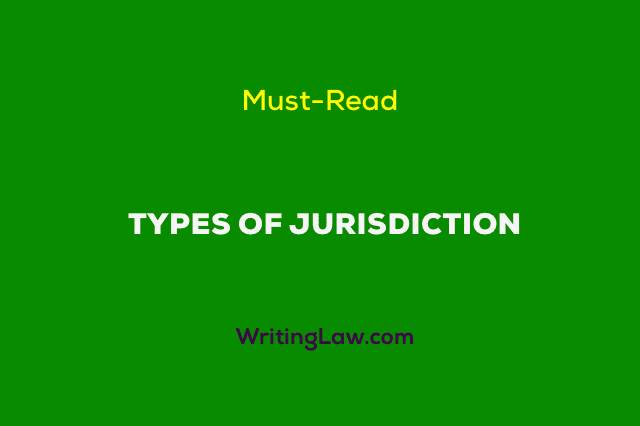
The word jurisdiction is derived by combining two Latin words – “Juris” and “dicere”. Juris means law, and dicere means speak. Hence jurisdiction refers to the power of courts to settle disputes. Jurisdiction is nowhere defined in any legal statute.
10 Types of Jurisdiction
These are the ten main types of jurisdiction of Indian courts:
Let us learn more about all these kinds of jurisdictions.
1. Pecuniary Jurisdiction
The word pecuniary means money. Hence it refers to the power of courts to decide cases that are within monetary limits. In other words, the suit is maintainable in the court if its value does not exceed the monetary limits of the court.
For example, the court of Civil Judge Junior Division has a pecuniary jurisdiction limit of Rs. 50,000. Hence, the said court cannot try suits whose value (value of the property) exceeds Rs. 50,000. Likewise, every court has its pecuniary limits.
2. Territorial Jurisdiction
This jurisdiction refers to the geographical boundary limits of the court to decide cases.
For example, if the suit property is situated in Kolkata, it cannot be tried in Bombay.
3. Subject Matter Jurisdiction
It refers to the power of courts to try cases related to a particular subject. The courts cannot try those cases whose subject is beyond their power of jurisdiction.
For example, suppose Rakesh buys consumer goods, and it is found to be defective. After several requests, the seller refused to replace the item. In this case, Rakesh has to file a suit in the District Consumer Redressal Forum and not in any other court or tribunal. Here the District Consumer Redressal Forum has subject matter jurisdiction over the same to try the case.
4. Exclusive Jurisdiction
This refers to the power of courts to try the cases exclusively referred to it. In any contract or agreement, the mentioning of the jurisdiction of courts takes place, which is then given effect if any dispute arises between the parties.
For example, certain agreements and contracts contain clauses like – Any disputes arising will be subject to the jurisdiction of Puri courts. Hence, in such cases, the suits will be tried at Puri courts.
5. Concurrent Jurisdiction
This refers to the power of two or more courts from different jurisdictions to try the suits referred to it.
For example, certain agreements and contracts contain clauses like – Any disputes arising will be subject to the jurisdiction of Puri courts or courts in New Delhi. Hence, in such cases, the suits can be tried at Puri courts or courts in New Delhi.
6. Appellate Jurisdiction
This jurisdiction refers to the power of courts to decide the appeals of cases that the sub-ordinate courts have already decided.
For example, the High Court of the State has appellate jurisdiction over all the District Courts of the State.
7. Original Jurisdiction
Original jurisdiction refers to the power of courts to take judicial note of any matter in the first instance.
For example, the family court has the power to try cases related to family disputes. Hence, the family court has original jurisdiction over the matter.
8. Special Jurisdiction
This power is given to the courts to try suits of special nature.
For example, if by order of the concerned authority, power is given to fast-track courts to try juvenile cases, it is called special jurisdiction.
9. Legal Jurisdiction
This power is provided to the courts by the statutes, Constitution etc.
For example, the discretionary and inherent power of courts.
10. Extending Jurisdiction
In such cases, the court will interpret and describe the jurisdiction and try the case.
For example, the Parliament of India may by law extend or exclude the jurisdiction of High Courts.
Read Next:
1. 5 Types of Court Opinions and Their Significance
2. Civil Appeal or First Appeal as Per the Civil Procedure Code
3. What Are the Discretionary Powers of the President of India
- 10 Types or Kinds of Jurisdiction of Indian Courts - 13th April 2022
- Malicious Charge of Offence Under Section 211 of the Indian Penal Code - 17th March 2022
- About Supreme Court of India – Collegium, Powers, Judges - 7th February 2022







